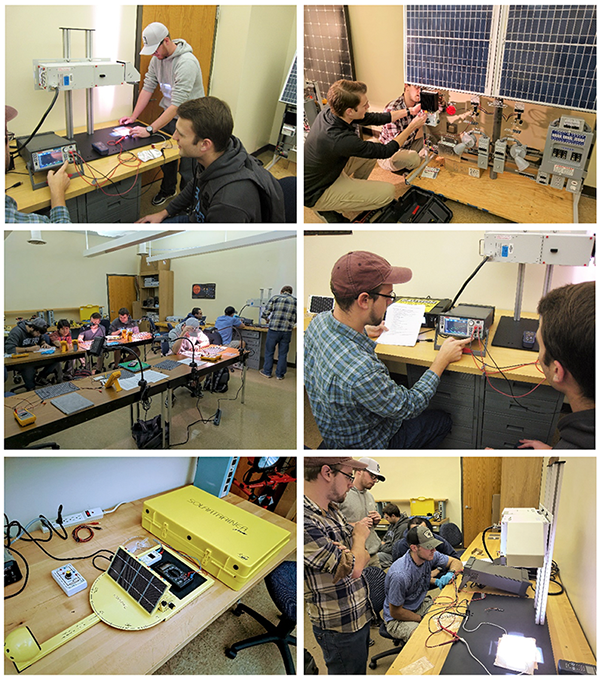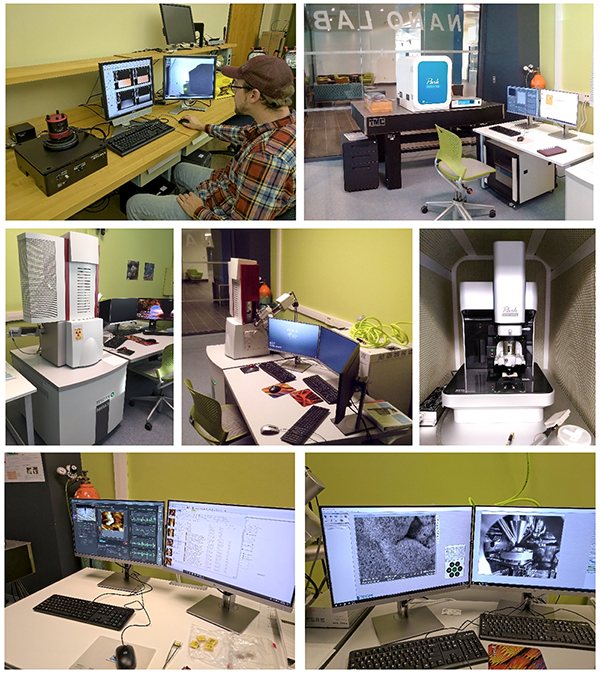The Engineering Technologies Department has 10 laboratories dedicated to support of EET and CET laboratory courses, projects, and hands-on experience. Many of the labs are open beyond scheduled lab periods so students can investigate more extensively concepts developed in their courses.
Communications, Controls, Digital-Microprocessor and Photovoltaic & Nanotechnology labs are equipped with a variety of instrumentation described below. Much of the instrumentation in these labs is state-of the-art equipment of the type that students will encounter in industrial settings, including meters, oscilloscopes, plotters, signal generators, frequency counters, spectrum analyzers, data and protocol analyzers, OTDRs, specific solar-photovoltaic and nanotechnology equipment, etc.
The department has established a multi-purpose EET lab equipped with sixteen stations. These computers are used for CAD, general purpose report writing using Microsoft Office and for support of EET, ECE and CET lab courses. Application software supporting a range of courses includes Electrical CAD software PCAD2007 for Schematic Capture and PCB layout, assemblers and general purpose tools such as Micro Sims Schematic and Pspice A/D and Basics, Circuit Analysis software, Electronics Workbench, and MATLAB by the MathWorks supporting Controls and Communications courses; and SILO software supporting digital design and OptSim, LAN Planner solo and MIDE software packages; The department continues to add applications software to provide easy access on these high performance computers for EET and CET coursework.
Controls: The control systems laboratory is equipped with EMMA II microprocessor control systems for speed and position control of dc/stepper motors. Six stations of in-house designed DC and Stepper Motor trainers have been added to the control system lab. The laboratory also has two Feedback Robot arm and PLC workcell conveyer. Siemens and Gould Modicon PLCís are also housed in this laboratory.
Communications: Labs are equipped with Microwave trainer systems, Mobile communication trainer, Doppler radar trainer systems, PC based analog and digital communication systems, wireless LAN, an FDDI LAN, HP protocol analyzers, spectrum analyzers, RF field strength analyzers and Emona communication modules for digital and wireless communications. An experimental lab running multi protocol network with TCP/IP is used for ETC416 and is equipped with a Cisco Router.
The fiber optics lab is equipped with optical time domain reflectometers (OTDR), fusion splicers, optoscope, power meters, optical spectral analyzers, couplers and Erbium doped fiber amplifier, light sources in addition to infrared viewers, cameras, coherent fiber optics, fiber optic telecommunication links and plastic and glass fibers. This lab is also equipped with various splicing, connectorizing, cleaving and polishing kits and tool accessories necessary to provide students with hands-on experience.
Digital: The digital systems design laboratories are fully equipped with equipment which can handle systems based on the Intel architecture. Microprocessor: Microprocessor laboratories supporting microprocessor courses include: EPROM and PLD programmers; 68HC12 microcontroller trainers; MicroChip PIC trainers and programmers; Tektronix 308 8-channel logic analyzers; Tektronix 338 32-channel logic analyzers and PC Windowsbased 40-channel logic analyzers.
Solar-Photovoltaics: The lab is equipped with state-of-the-art instruments such as Sciencetech solar simulator, solarimeters, Keithley Source-Meter 2450, 6 solar cell characterization stations, electrolysis - fuel cell demonstration kits, and 2 Marcraft GT-1000 insular/grid-connected photovoltaic systems for demonstration of full system operation. Students will be able to deepen the theoretical knowledge and experiment with the fundamentals of solar cell operation using different solar cells under various illumination conditions. The complete photovoltaic systems (modules-MPPT charger-battery-invertor-grid) allow students to test and understand the PV system operation under various illumination and connectivity conditions.
 Photovoltaics Lab
Photovoltaics Lab
Nanotechnology: For understanding the operation and the manufacturing of the nanoscale semiconductor devices, the ability to “see” them and characterize their properties is essential. The nanotechnology lab enable students to become familiar with the operation of the most advanced instruments of this kind such as Atomic Force Microscope (AFM), and Scanning Electron Microscope (SEM) including the Energy Dispersive Spectroscopy (EDS) module. The lab is equipped with a Veeco “diCaliber” AFM, a last generation Park NX 10 AFM and a Tescan Mira 3 SEM.

Nanotechnology lab
Moreover, students learn how to fabricate semiconductor films using techniques such as Sol-Gel, Electrodeposition, or sputtering during the lab activity associated with the term project.

